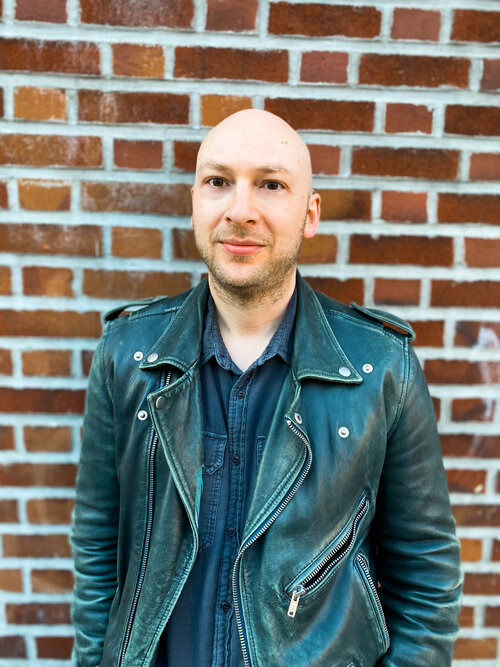In Jewish stories, wrote Saul Bellow, “laughter and trembling are so curiously intermingled that it is not easy to determine the relations of the two.” If Bellow was right—and I’m inclined to trust his judgment—then Adam Wilson’s Sensation Machines is as timelessly Jewish as it is urgently, topically American. The source of laughter and trembling in Wilson’s second novel is a barely-distant future in which automated labor, corporate greed, and a floundering dollar have left the United States is on the brink of financial ruin. We enter the world of this dark techno-comedy through Michael and Wendy Mixner, a Brooklyn couple mourning the loss of their newborn daughter. Unbeknownst to Wendy, the family’s troubles are just beginning. Her husband, a Wall Street derivatives trader, has lost their savings in a reckless investment, and when Occupy-style protests turn violent, the Mixners’ marriage becomes entangled in the nation’s economic woes.

Sensation Machines overflows with garrulous, high-energy characters, but preserves the intimacy and wit of Wilson’s debut novel, Flatscreen (2012), and his story collection, What’s Important Is Feeling (2014). (The former was a finalist for the National Jewish Book Award; the collection’s title story received the Paris Review’s Terry Southern Prize for Humor.) On the page Wilson, a natural ventriloquist, slides gracefully between manic, foul-mouthed provocation and heavy-hearted sobriety. In conversation he is soft-spoken, thoughtful, gracious, and funny: when I mentioned American Pastoral, Philip Roth’s novel about a leather glove manufacturer, Wilson regaled me with an idea for a musical adaptation—Eat, Pray, Glove—that left me braying. We had the following conversation over Zoom before editing our respective sections for content and clarity.
Sam Gold: What was the origin of Sensation Machines?
Adam Wilson: I started writing this book in 2011, but the impetus came in 2008, when I was working at Simon & Schuster as a digital proofreader. Simon & Schuster’s offices are in Rockefeller Center, which was around the corner from Lehman Brothers, and so I was there when the market crashed and Lehman Brothers went under. Shortly after, I ran into a guy I’d grown up with who’d gone on to work at Lehman. I ran into him at a moment of crisis for him—he didn’t know if he’d keep his job in the Barclays buyout—and I felt sympathy for him. Whatever personal role (if any) that he’d played in this global economic collapse, he was also a human being, and someone I’d known as a kind person, a real standup guy.
Then, in 2011 when the Occupy movement emerged and I was attending the protests in Zuccotti Park, I kept flashing back to this old friend, and thinking about how strange it was that he was part of this group that had become a repository for so much anger, and a symbol of all that was wrong with our system, a faceless avatar of greed and evil. I thought it would be an interesting challenge to try to humanize this type of character, and I hoped that in writing from the perspective of one of these avatars, I might better understand who they were, and how they’d ended up complicit in this thing—the global market collapse—the consequences of which were extensive and catastrophic.
Your version of this figure is Michael Mixner, a derivatives trader who narrates much of the book. He doesn’t resemble a typical finance bro. He grows up in a working class Jewish family and stumbles into his Wall Street job. He’s not especially greedy or ruthless. He doesn’t foam at the mouth.
There are a couple reasons for that. One is that there have been a lot of depictions of the kind of character you’re describing, from Wall Street to The Wolf of Wall Street to the seemingly endless parade of narrative non-fiction books by Michael Lewis. Our culture has a very specific and somewhat rigid preconception of what a Wall Street trader looks like, and I wanted to write a character who challenged that preconception. I also knew that in order to inhabit this character, he had to bear a certain resemblance to me, by which I mean that I had to be able to imagine making some of the choices he’d made, one of those choices being the choice to pursue a career on Wall Street. How might a guy like me have ended up as a derivatives trader? And so I wrote a character who was less based on any actual finance bros that I knew or had known, and was more of an exaggerated version of myself, crafted to magnify my own feelings of guilt regarding my complicity in a fucked up system—American capitalism—that the choices I’ve made—by which I largely mean the choice to accept this system rather than risk my comfortable status within it—work to passively perpetuate. So, much like me, Michael has intellectual and artistic ambitions. But unlike me, he comes from a financially struggling lower middle class family, and he sees a career on Wall Street as the easiest path to upward mobility. And I think that’s probably a lot of the reason why people end up working on Wall Street. Finance is romanticized in pop culture, but the people I knew who ended up going to work at hedge funds and investment banks were mostly just nice guys who were good at math and wanted to drive cool cars.
One of my worries about the book is that Michael feels unrealistic in that he doesn’t resemble any Wall Street trader I’ve ever met. Ultimately, I had to accept that I wasn’t so interested in verisimilitude. There are other writers who can depict the culture of Wall Street much more accurately than I can. In Sensation Machines, I was more interested in using Michael’s job as a metaphor. There’s a reason why you never really see Michael at work, and that the book begins with him already checked out of his job, which he was pretty bad at to begin with.
Being a lousy derivative trader is part of how Michael bears your authorial imprint. There’s a family resemblance between him and Eli Schwartz, the narrator of Flatscreen—which is to say, there’s a touch of the fuck-up, the underachiever about him. To be more precise: your characters are often Jewish underachievers, which strikes me as an under-explored literary subject.
Sam Lipsyte has some pretty good Jewish underachievers. Stanley Elkin too. Philip Roth had underachievers in a different way. They’re good boys who are not so good when it comes down to it. Though maybe Roth’s are less fuckups than deviants. But Michael too is quite successful on paper—Ivy League diploma, fancy job title, big apartment—and it’s only when these things turn out to be not enough in the face of a very real grief does he begin to destroy them.
Reading Sensation Machines I was reminded of a Roth line, in which one of his characters describes an imperative he and his boyhood friends receive from their parents: “You must not come to nothing. Make something of yourselves.” Your books, by contrast, concern either flamboyantly flawed Jewish flops or—as with Michael and his wife, Wendy—success stories gone awry. Has the commandment to make something of yourself, which is so American and so Jewish, become naive or outdated?
My characters come from a different generation of Jews. They come from a post-assimilated Jewish America which marks them as being very different from Roth’s and Saul Bellow’s Jewish characters. Though Michael doesn’t come from money, my characters—Wendy and the characters in Flatscreen and in my stories—come from families that have already in some sense made something of themselves. So it’s down to the next generation to figure out what they’re supposed to do. And each character has a different answer to that question. For the characters in this book, this answer is rooted in the traumas of their childhoods, and with Michael and Wendy specifically, it’s rooted in how these traumas relate to their class statuses within their own communities.
Another point of connection to Flatscreen is your characters’ tendency to ruminate about pop culture. Michael dreams of writing a book about Eminem. Another character, a doorman in a luxury building, maintains a blog about sports and TV and critical theory. Why make your characters frustrated cultural critics?
I’m not sure that these were calculated choices so much as that they were things that emerged because I’m interested in engaging with pop culture. Giving my characters those ambitions gives me permission to be tangential—to have this long riff on how 9/11 caused the decline of Sex and the City which in turn caused the downfall of the New York Knicks, say.
In grad school I took a class with the critic James Wood, and he talked about how Saul Bellow always found ways to make his characters “first class-noticers,” and how giving the character this attribute allowed Bellow to make Saul Bellow-ish observations. Maybe it’s a failure of imagination on my part that all my characters sound a bit like I do after one too many drinks, but I tend to like this kind of thing in other books, like how every character in a Steve Erickson novel or a Dana Spiotta novel is an expert on the Golden Age of American cinema, and Jonathan Lethem’s characters are always good for a rant or two about the Talking Heads, and all DeLillo’s characters are obsessed with the prospect of nuclear war.
It’s hard to imagine a Wilson protagonist who doesn’t try to make sense of his experience through film and TV and popular music. Can you tell me more about the appeal of Eminem and hip hop to Michael?
Eminem was a real object of fascination for me at one point in my life, and I could never quite reconcile my borderline obsession with his music with the way it repelled me. The Marshall Mathers LP, which came out my senior year of high school, was quite formative for me, but probably in some pretty negative ways. I was interested in exploring that, as well as in a larger exploration of hip hop’s influence on people of my generation who pursued careers in finance. One thing I’ve always been really interested in is the nakedly capitalistic attitude of many rappers, and especially the ones I listened to growing up in the nineties. In a capitalist culture everything is commerce, including art, and there’s something that’s always felt honest to me about the way hip hop refuses to deny this about itself. This exploration felt appropriate for a book that’s so concerned with different forms of commodification.
You mentioned starting the book in 2011. What was the writing and revision process like?
It was a long process. I had a first burst in 2011, but then Flatscreen came out in 2012, and then I was working on my story collection, What’s Important Is Feeling, which came out in 2014, and so I was working on the stories and on Sensation Machines side-by-side, and also doing other stuff like teaching and writing essays and criticism. So I didn’t really start working on SM intensely until 2013 or 2014. I went down some wrong paths, which slowed things down. There were hundreds of pages down the drain. The structure and form of the novel came by a very long process of trial and error in which there was quite a lot of error.
I finished a draft of the book toward the end of 2016. I was pretty happy with it. Then Trump got elected and I had to re-think everything. Essentially, the dystopia I’d imagined wasn’t dystopic enough. The novel’s vision of the future had to become even bleaker than it already was. That was really frustrating and difficult, and right up until the final version of the book I was making changes to make sure it still felt relevant and true.
It’s funny: originally the book was going to be set around the 2008 Wall Street crash, and I abandoned that because I realized that my understanding of global finance would still be prohibitively limited no matter how many books I read on the subject. So it seemed really freeing to set it in the near future where I could just make stuff up. But of course that turned out to be a challenge of its own because what that future looked like was suddenly shifting quite rapidly.
The novel’s future is characterized by bleakness and economic instability. Several characters, including Michael’s father, seek refuge in an augmented reality game and invest in its system of cryptocurrency. This seems to elaborate on a concern with the line between reality and simulation that you explored in Flatscreen.
I’m not trying to make a judgment about the virtues of “real” reality over virtual reality. I think it’s more complicated than that, and I don’t want people to read the book as a critique of technological progress. I do think the book is skeptical, not so much of the technologies themselves, but of the way they’re packaged, sold, and integrated—often so quickly that we haven’t had a chance yet to think about the consequences or ramifications of them. If the book is critiquing anything it’s the marketing of technology.
That’s where Wendy’s plot comes in. What does Wendy do for a living and what’s her role in the book?
Wendy Mixner is a marketing strategist and she is tasked with creating a marketing campaign, across a number of different platforms, to sway public opinion on a Universal Basic Income bill that the Senate is voting on. Her mission is abstract in the sense that she’s not selling a product so much as attempting to shift a cultural attitude, in this case toward the prospect of something that looks a lot like a step toward democratic socialism in America—she’s essentially a propagandist. And as with Michael, the challenge was to make her feel sympathetically human despite her doing something that feels inherently unsympathetic, and to make her choices feel, if not commendable, then at least understandable.
One of the book’s real achievements is Wendy. Her voice, the chapters she narrates, seem to free you as a writer. In fact, the novel employs a number of different points of view. Formally, structurally, that’s a new development in your work.
In part the book’s structure came about from wanting to do something different from what I’d previously done, and from feeling like I wanted to tell a bigger, more panoramic story. Flatscreen is a pretty insular novel; it’s narrated by an unreliable first person narrator who hasn’t experienced much in his life other than television and movies. His worldview is really limited. I wanted to get outside of that and write about some other types of characters in the hope that this larger canvas would allow me to tell a different kind of story, a bigger one. Also, if we were going to have another unreliable first person narrator in Michael, I wanted whatever he was telling us to be kept in check by these other characters, who could provide a window into a broader world beyond what Michael could see.
The way the novel’s structure works is that first there are first person sections that alternate between Michael and Wendy, and then there are third person sections that roam between a bunch of characters. The reason I did it that way, starting off with just Michael and Wendy, was that I wanted to avoid what often seems to be a failing of big-canvas novels, which is that in taking a panoramic view these novels sometimes feel like they’re sacrificing intimacy. The challenge was how to do both of those things: to make it feel like a big story with a complicated (maybe too complicated) plot, and big ideas and crazy stuff happening and lots of characters, but to do so in a way in which it still feels like an intimate portrait of this couple and their marriage.
I paused over a line that appears in one of those roaming third person chapters. An old friend of Michael’s, a recovering drug addict named Broder, reminisces about his wedding, in particular his longing for the wedding to end so he could be alone with his wife: “He’d lie with her in his arms, and inhale her scent, and only then would the day’s tiny dramas and mishaps take on a kind of humorous charm, because Broder had learned that there was nothing so lonely as the ongoing moment and the best part of life was the looking back.”
That line is almost a joke because it goes against the common wisdom regarding the importance of staying in the moment. I thought it would be funny, but also maybe poignant in some way, to have a character express an oppositional worldview, especially as we’ve become a culture that’s always looking on Instagram at the thing we did yesterday or what we just ate, and because of that we’re not really experiencing the moment. It’s not something I’ve ever heard anyone express before, the idea that this might actually be a positive rather than negative thing. But clearly it’s something that people must in some way believe or feel, because otherwise why would we spend so much time looking at pictures of ourselves from five minutes ago?
I also think that there’s maybe something Jewish in this notion, something Larry David-ish about the idea that it’s inherently more enjoyable to talk about things than to do them. And there’s some truth to that. I enjoy complaining about how bad movies are at least as much as I enjoy actually watching them. But I also think that if you take it from this character, who if you read the novel you’ll see is stuck in his own past in a way that is ultimately quite damaging, you have to take it with a grain of salt.
When the book opens, Michael and Wendy are mourning the death of their newborn daughter, and that loss permeates the chapters they narrate. You became a father while you were working on Sensation Machines. Has that affected your writing, or the book, or your view of the world?
It absolutely changed all of those things. It especially changed my understanding of the grief that Michael and Wendy feel, though I hope I never truly understand that grief because I hope I’m never in that situation. But the book changed because of that. And now being a father has changed my writing because I don’t write anymore. There’s a pandemic and there’s no childcare and my wife is in Zoom meetings seven hours a day, so I’m just a one-man daycare most of the time.
In a few years I’ll ask you if it’s possible to be a good writer and a good dad at the same time. With any luck, we’ll be able to do the next interview in person.
I hope so. I hope so.
Samuel Gold is a doctoral candidate in English at the CUNY Graduate Center. He is on Twitter @aglassoranapple
This post may contain affiliate links.







